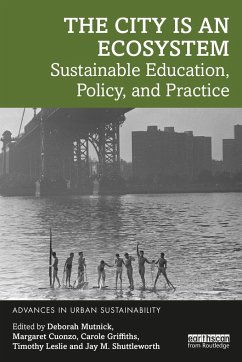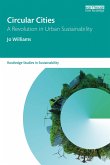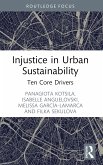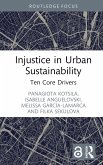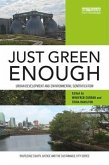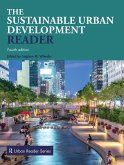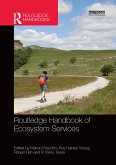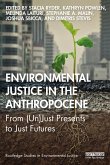The City is an Ecosystem maps an interdisciplinary, community-engaged response to the great ecological crises of our time-climate change, biodiversity loss, and social inequality-which pose particular challenges for cities, where more than half the world's population currently live.
Across more than twenty chapters, the three parts of the book cover historical and scientific perspectives on the city as an ecosystem; human rights to the city in relation to urban sustainability; and the city as a sustainability classroom at all educational levels inside and outside formal classroom spaces. It argues that such efforts must be interdisciplinary and widespread to ensure an informed public and educated new generation are equipped to face an uncertain future, particularly relevant in the post-COVID-19 world.
Gathering multiple interdisciplinary and community-engaged perspectives on these environmental crises, with contemporary and historical case study discussions,this timely volume cuts across the humanities and social and health sciences, and will be of interest to policymakers, urban ecologists, activists, built environment professionals, educators, and advanced students concerned with the future of our cities.
Across more than twenty chapters, the three parts of the book cover historical and scientific perspectives on the city as an ecosystem; human rights to the city in relation to urban sustainability; and the city as a sustainability classroom at all educational levels inside and outside formal classroom spaces. It argues that such efforts must be interdisciplinary and widespread to ensure an informed public and educated new generation are equipped to face an uncertain future, particularly relevant in the post-COVID-19 world.
Gathering multiple interdisciplinary and community-engaged perspectives on these environmental crises, with contemporary and historical case study discussions,this timely volume cuts across the humanities and social and health sciences, and will be of interest to policymakers, urban ecologists, activists, built environment professionals, educators, and advanced students concerned with the future of our cities.
"In a world where most people live in cities, charting a sustainable course into the future demands that we take urban environments as seriously as any other. This volume is filled with interesting ideas about what that means-and how it might give us real leverage against the scourge of radical inequality."
Bill McKibben, author of The End of Nature
"The City is an Ecosystem artfully demonstrates the sciences and the humanities working together under climate crisis conditions. With integrated knowledge around everyday concerns in urban settings, and aiming for systemic change, this volume will be invaluable to teachers, researchers and activists working on the inequities introduced by climate change."
Elizabeth Mazzolini, author of The Everest Effect: Nature, Culture, Ideology
"The City is an Ecosystem: Sustainable Education, Policy, and Practice delves deeply into the interrelated nature of urban climate change, biodiversity loss, and social inequality. It highlights cities as socio-ecological systems with a focus on human rights, equity, and justice and identifies impactful opportunities for enhancing urban sustainability education."
Cynthia Rosenzweig, Head of Climate Impacts Group, NASA Goddard Institute for Space Studies
Bill McKibben, author of The End of Nature
"The City is an Ecosystem artfully demonstrates the sciences and the humanities working together under climate crisis conditions. With integrated knowledge around everyday concerns in urban settings, and aiming for systemic change, this volume will be invaluable to teachers, researchers and activists working on the inequities introduced by climate change."
Elizabeth Mazzolini, author of The Everest Effect: Nature, Culture, Ideology
"The City is an Ecosystem: Sustainable Education, Policy, and Practice delves deeply into the interrelated nature of urban climate change, biodiversity loss, and social inequality. It highlights cities as socio-ecological systems with a focus on human rights, equity, and justice and identifies impactful opportunities for enhancing urban sustainability education."
Cynthia Rosenzweig, Head of Climate Impacts Group, NASA Goddard Institute for Space Studies

